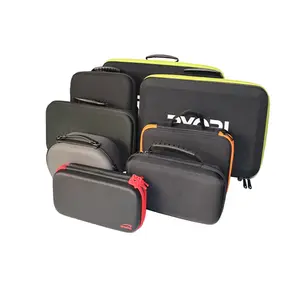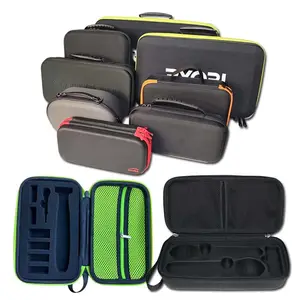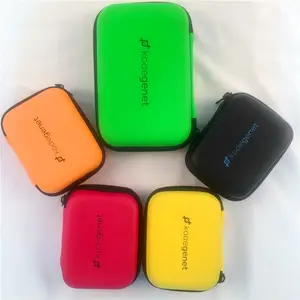(93 products available)






















































































































































































































Using a particular case for several multiple hard drive storage cases offers some advantages. For instance, it eliminates usage redundancies and improves overall efficiency. Below are the various types of multiple hard drive storage cases:
Enclosures
An enclosure is a hardware device that houses one or, in most cases, several hard drives while providing the necessary interface to connect to another system like a computer. Multi-bay drive enclosures have several slots, allowing multiple drives to be installed at the same time. These enclosures support RAID configurations, which combine multiple drives for better performance or data redundancy.
DAS (Direct Attached Storage)
Direct-attached storage connects directly to a computer or server via USB, Thunderbolt, or eSATA. A multi-bay DAS unit holds multiple drives in one place, providing extra storage space. This setup is often found in small business or home office environments where networked storage is not needed.
NAS (Network Attached Storage)
Network-attached storage is a file-level computer data storage that connects to a network and allows a variety of clients to retrieve data from the centralized disk storage. Multi-bay NAS devices can house multiple hard drives and be accessed over a network. They are widely used by businesses to store, share, and back up data.
External HDD Caddies
These are simple external cases for hard drives that provide additional storage options. While they usually support one drive at a time, they can be useful for users who need to operate several drives sequentially. They are portable and powered through USB, making them ideal for mobile use.
RAID Arrays
A redundant array of independent disks is a data storage virtualization technology that combines several physical disk storage elements into what appears to the operating system as a single logical storage unit. Multi-bay RAID enclosures provide RAID levels for data redundancy and performance. Users can configure drives in different RAID levels depending on their needs for speed or security of data.
Media Production and Broadcasting
In the fast-paced world of media production and broadcasting, the ability to store, access, and transfer vast amounts of high-definition video and audio data is crucial. Multi-bay storage solutions for hard drives are essential for video editing suites and broadcast studios, providing the necessary speed and capacity for complex editing and live-streaming operations.
Medical Imaging and Data Storage
The healthcare sector generates huge amounts of data, from patient records to complex imaging studies. Multiple hard drive storage cases safeguard this invaluable data. They are utilized in hospitals and clinics to hold large quantities of medical images, ensuring quick retrieval and compliance with data security standards.
Scientific Research and Data Analysis
Scientific research frequently requires the storage of enormous sets of data collected from experiments, simulations, or observational studies. Multi-drive storage solutions in research institutions and laboratories enable the safe retention of this data, thereby allowing scientists to perform complex analyses without worrying about data loss or storage limitations.
Engineering and CAD-CAM Systems
Complex engineering designs require large storage capacities, especially for 3D models, simulations, and design blueprints. Multi-bay storage solutions allow engineering firms to efficiently manage these large data sets, thus facilitating smooth operations within computer-aided design and manufacturing systems. This reduces the likelihood of database clutter, which is also an important aspect of maintaining efficiency.
Surveillance and Security Systems
Modern surveillance systems, which use HD video cameras, generate vast amounts of footage that must be properly stored and easily accessed. Multi-HDD storage cases are deployed in public and private security sectors to house video data from multiple cameras simultaneously. This also helps users archive video over long periods of time and retrieve video in case of an incident.
Storage Capacity
The storage capacity of external hard drive cases directly correlates with the number of hard drives they can house and the capacity of each individual drive. Cases with more bays tend to have higher storage capacities. Caddies are available in a range of capacities, with larger ones supporting multiple terabytes.
Drive Compatibility
Different types of hard drives require their native interfaces or file systems. Multiple hard drive storage cases are available in a number of interfaces to ensure compatibility with SATA or SSDs. It may be necessary to format the drives for use with certain operating systems.
Connection Interface
The type of connection interface on the external hard drive case will determine the data transfer speed. USB 3.0, USB-C, Thunderbolt 3, and eSATA are common interfaces, and each offers different speeds. High-speed interfaces are better for intensive applications like video editing or running virtual machines.
RAID Support
Some multi-bay cases support RAID configurations, which can improve performance or data redundancy depending on the RAID level selected. RAID 0, for example, will enhance performance by spreading data over multiple drives. RAID 1 will provide redundancy by mirroring data on two drives.
Cooling System
With several drives operating within the same environment, reliable cooling will be needed in order to avoid overheating. Fans, vents, and heat sinks are used in certain models of cases to ensure optimal hard drive temperatures. This prolongs drive lifespan and prevents data corruption.
Portability and Build Quality
While some multi-drive cases are built for stationary use in data centers or studios and are therefore highly durable, others are designed for users who require portability. Rugged cases, which are commonly used in industries such as field research or film production, are made from impact-resistant materials and offer better drive protection.
Assess Storage Needs
The first criterion in selecting the most suitable multi-hard drive storage case for the sake of business starts with determining the storage needs. This depends on the type of business as well as the industry's specific requirements. For example, media firms and data centers require cases with RAID and high storage capacity.
Interface Compatibility
Various operating systems and computers are compatible with specific interfaces. For example, USB 3.0, USB-C, and Thunderbolt 3 provide varying speeds of compatibility. Businesses should ensure that the storage case interfaces are compatible with their current hardware to avoid extra expenses and inefficiencies for the sake of ease in connection.
Performance Requirements
There is no need to worry about it when a business has high-performance requirements, such as running virtual machines or large databases, as it should seek out a storage solution that will provide RAID configurations to help enhance speed and redundancy. What this does is that it spreads the workload between the drives, thus improving read and write speeds and mirroring or parity of data that protects against loss.
Scalability
It is very important for businesses in so many fields, such as media and IT services, to have a multi-hard drive storage case that is scalable. A scalable storage solution has more bays, with which additional drives can be accommodated as the business data grows over time. This will, in turn, reduce the need for a re-storage system in the short run.
Cooling and Noise Levels
Multi-drive setups can potentially become noisy due to overheating. There should be proper cooling in cases of large multi-drive setups to manage temperature and drive performance. It shouldn't just have cooling fans but should also make sure that the fans are quiet, especially for businesses in broadcasting or recording studios, where background noise will affect all the operations.
Budget
In the selection of equipment, the most important factors of cost-effective procurement will be understanding the total ownership cost and setting a proper budget. When looking for a storage solution, businesses should consider the price of both the initial purchasing and future maintenance. In some cases, additional investments in premium RAID storage or enhanced security features will repay themselves over time by providing better performance and reliability.
A1: Yes, most Of the multiple hard drive storage cases support both solid state and hard disk drives. However, it is always better to check for this particular specification.
A2: Several multi-bay enclosures are fitted with hardware RAID. These allow users to set up different RAID levels for purposes of redundancy or enhanced performance.
A3: The most common interfaces for these storage cases are USB 3.0, USB-C, and Thunderbolt 3. Users are, however, advised to select one that is compatible with the existing systems.
A4: Multi-bay enclosures usually have extra bays to allow for additional HDDs. Cases that are expandable are more appropriate for long-term storage growth.
A5: Many multi-bay storage cases have fans, vents, and other cooling mechanisms to cool the cases. This work's operational efficiency, especially with the use of various drives concurrently.